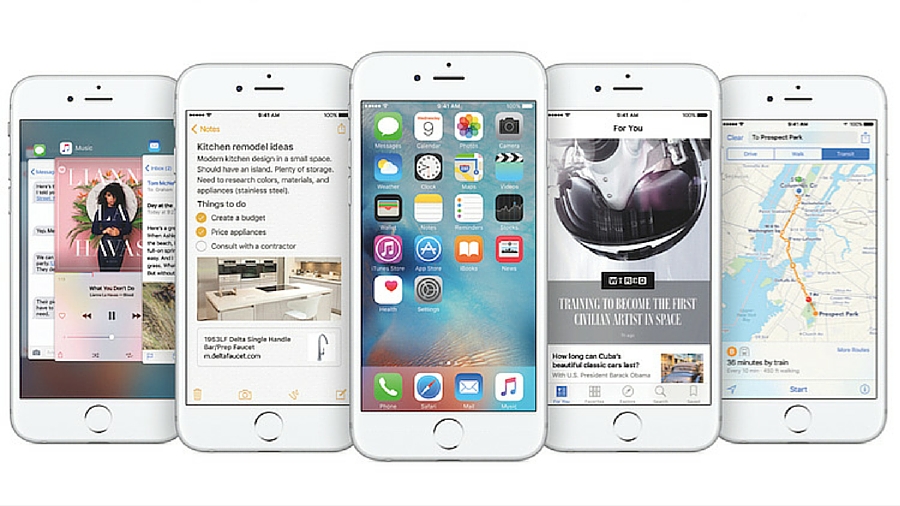Are we entering the post-app era?
The concept of an app is changing fast

Sign up for breaking news, reviews, opinion, top tech deals, and more.
You are now subscribed
Your newsletter sign-up was successful
What would a 'world beyond apps' be like? It's hard to imagine using a smartphone that doesn't have any apps, and yet there has been talk of the 'post-app era' for some time. Cue futuristic ways of interacting with computers and data, with virtual assistants and natural language processing at the forefront.
However, few think that apps are going to disappear completely, only that the way we interact with them will change. "In the near-term we will see a demise of individual apps at the front-end, with instant messaging and social media interfaces used as a gateway into technologies," says Claus Jepsen, Chief Architect at business software company Unit4.
So will we still be physically opening apps in a few years? Probably not, but that trend started when push notifications appeared on our phones long ago. Since then, apps have added always-on functionality, background monitoring, interactive notifications, integration with wearables, and automatic updates.
Now get ready to watch as apps are consumed within contextually-aware virtual assistants like Siri – and almost completely disappear.
Apps on the rise… and fall
Ever since the creation of the smartphone, the App Store has been a battleground between Apple and Android. So who won? Although apps in Apple's App Store make the most money, they accounted for just 15% of all apps downloaded in 2015. IDC reports that Apple's share fell 8% from the previous year – quite a tumble, and largely down to the massive volume of Android-based phones being sold around the globe.
"While IDC forecasts that mobile app installs and direct revenues will continue to grow over the coming years, it also expects that growth to slow considerably," says Michael Allen, Solutions VP at application performance management software company Dynatrace. "For businesses, this offers a wake-up call that the mobile race is starting to reach its climax – consumers are reaching app saturation, and they're now looking for quality over quantity."
That's borne out by Dynatrace's own research, which found that nearly half (47%) of people will only give an app three seconds to load before they give up and go elsewhere, while nearly a third (32%) will never try it again if it doesn't work the first time.
Sign up to the TechRadar Pro newsletter to get all the top news, opinion, features and guidance your business needs to succeed!

Blame the browser?
It's not always the apps' fault – some apps lose their shine over time. Remember that flashlight app on your phone? Now it's built into the phone itself. There are speciality camera apps, polished email apps and countless pointless brand apps, but few of them add much to what your phone can already do. Besides, the mobile web is getting more app-like every day.
"It really depends on what we mean by an app," says Jamie Turner, CEO of address verification and data quality services company PCA Predict. "Many apps are little more than website bookmarks pointing to a mini-site that looks and feels like something that's native."
Turner thinks that we only have native apps because they operate without the performance and security limitations of a browser. "This is changing fast with significant work being placed into newer browser technology that feels as fast as native apps and more sensible security models," he adds.
However, even slick mobile websites can't get round the inherent problem with apps; their scope is very limited. Spotify aside (its 30 million tracks make this service the de facto web-based music library), how many apps do anything other than give you access to a walled garden of content?
Nobody wants to use the Uber or Lyft apps specifically, they want to get a ride. It's the same with Netflix. Rather than go hunting for a particular movie and failing to find it, wouldn't it be easier if your phone just told you where to find that movie?

Goodbye apps, hello smart agents
We've fallen out of love with apps, and that's not going to change. Gartner predicts that by 2020, smart agents will facilitate 40% of mobile interactions, and that 'post-app era' will begin to dominate. For 'smart agent', read virtual private assistants like Google Now, Cortana, Siri and Alexa, each stuffed with so-called 'learning algorithms' and artificial intelligence.
These agents will be the principal way that we navigate information. "No longer will you have to load a specific application," says Gartner. "The algorithms on the systems that you touch will understand your needs and serve you the correct data in context." The future is algorithms, not apps.
- 1
- 2
Current page: Introduction and blame the browser
Next Page App aggregation and the post-app futureJamie is a freelance tech, travel and space journalist based in the UK. He’s been writing regularly for Techradar since it was launched in 2008 and also writes regularly for Forbes, The Telegraph, the South China Morning Post, Sky & Telescope and the Sky At Night magazine as well as other Future titles T3, Digital Camera World, All About Space and Space.com. He also edits two of his own websites, TravGear.com and WhenIsTheNextEclipse.com that reflect his obsession with travel gear and solar eclipse travel. He is the author of A Stargazing Program For Beginners (Springer, 2015),
